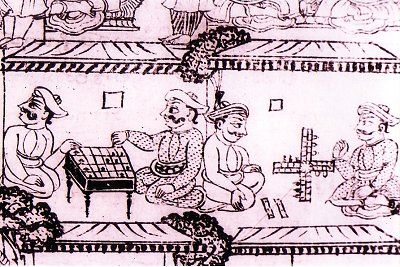English: Mummadi Krishnaraja Wodeyar had the longest reign among rulers of Mysore (1799 - 1868). He had varied interests in life -- music, painting, literature -- each of which he loved and tried his hand in. He spent liberally on promotion of learning and patronized a number of scholars. He is credited with the authorship of 109 works in Kannada and Sanskrit! It was a common custom in royal courts for littnvf
érateurs to write and dedicate their works to their patrons, or to seek permission to lend his name to their writings. But, among the works attributed to Mummadi, scholars are united in identifying some Devata-Stutis (hymns in praise of Gods), a work on games and Sougandhika Parinaya (wedding of Sugandhika), a prose romance, as Mummadi's own creation.
Sougandhika Parinaya (Parinaya = wedding) was a new experiment in prose-writing. Neither borrowed nor adopted, it has a mythological theme written in puranic style. The same work was later rendered into poetry (6,000 verses) and a play was also written, showing its popularity.
The theme involves Lord Indra, the king of heaven. Under a curse by the sage Durvasa he is born as prince Sugandharaja in the land of Karnataka to pious parents. His childhood, youth and training for kingship are described. His several exploits to win over princess Sougandhika who was born under similar circumstances, in Kalinga form the bulk of book. There are several episodes incorporated, while Sugandharaja starts to fulfil eight conditions laid down by Sougandhika to marry her. Religion, Philosophy, Yoga, astronomy, erotics, zoology, botany, music, horse and elephant-lore, horticulture, digging of wells and lakes, in short all topics a king was supposed to study are discussed. The prince excelled in all!
The book is profusely illustrated. Mummadi had started a lithograph press in the palace premises and himself was a painter. He experimented with color pictures.
True to the tradition of religious tolerance of the land, equal importance is given to Hari and Hara that is Vaishnava and Shaiva Sectarian worship. However, prominence is given to Chamundeshwari, the titular-deity of Mysore Kings. All chapters start with prayers to Shri Chamundeshwari with whose blessings the prince is able to achieve his goal and marry his dream-girl. Nanjundeshwara also figures as an important deity.
The pictures or lithographs of Sougandhika Parinaya are a good record of social life in Mysore region in early nineteenth century. They provide rare glimpses of female and popular education, horticulture including grafting and native versions of Ikebana and Bonsai, plans of buildings, battle-scenes, architecture of temples and palaces, popular games, hunting scenes and court life. We find happy blend of Old and new, eastern and western life-styles. Ordinary citizens are depicted in their true colors. The king and nobles are shown in colorful dresses and heavy ornaments could be identified in women's attire. The soldiers are in European uniform or livery, carrying guns while attacking demons! Characteristic mirrors, chandeliers, tables and chairs find rightful place in Mysore style of painting. This first prose-romance in Kannada is a good documentation of society of the times.


